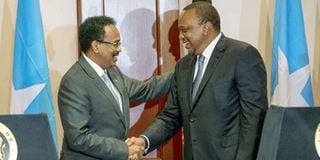Somalia should consider diplomacy after ICJ verdict

President Uhuru Kenyatta (right) and his Somalia counterpart Mohamed Farmaajo after their a joint press conference in Nairobi on November 14, 2019.
What you need to know:
- Past attempts at resolving the maritime dispute amicably provide a good basis to kick-start diplomatic efforts.
- Allowing an escalation of tensions between Kenya and Somalia will likely fuel further deterioration of insecurity.
Kenya was bound to reject the recent decision of the International Court of Justice (ICJ) on the disputed 100,000-square-kilometre maritime zone in the Indian Ocean claimed by the two countries, having already withdrawn its legal team in March this year.
Moreover, throughout the pendency of the case at the ICJ, Kenya has been calling for a diplomatic resolution to the dispute on the basis of the memorandum of understanding signed by the two states in 2009, but which Somalia later disowned, arguing in part that it was never ratified by its Parliament. Kenya also repeatedly invoked the United Nations Convention on the Law of the Sea, to which both states are parties, as providing a dispute resolution mechanism.
There are two reasons for giving diplomacy a chance in resolving the impasse. One, past attempts at resolving the maritime dispute amicably provide a good basis to kick-start diplomatic efforts aimed at bringing both sides to the table. This should not be difficult given that recent disputes involving countries in the region have mostly been handled without having to resort to international courts and tribunals.
Two, allowing an escalation of tensions between Kenya and Somalia will likely fuel further deterioration of insecurity with extremists taking advantage of the political fallout to advance their criminal ideology of violence by painting Kenya as the aggressor so as to stoke sympathy among those they target to recruit.
Anti-Kenya sentiment fanned by populist Somali politicians keen on exploiting nationalistic propaganda in the coming elections in Somalia is a likely outcome.
Third, creation of a new conflict zone would lead to disruption of economic activities in the maritime zone, depriving millions of people of livelihoods.
However, in the event that diplomacy fails, then Kenya has an inalienable right to protect and defend her sovereignty, which includes her territorial waters, against internal and external aggression.
Mr Mwachinga is an advocate of the High Court of Kenya. [email protected]




